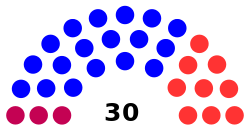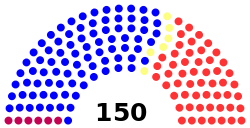Or proportional representation?
Hopefully proportional representation at the congressional level should be the goal regardless of the system. The issue with the districting approach is that people move, pass-away, have kids, etc... all at variable rates. I suspect that districting was implemented in the first place to attempt to simplify certain aspects...however the variables I mentioned cause it to be a system in which it's destined for issues from the moment it starts.
Let's pretend for a moment there's a state with only 3 districts and a total population of a 3,000 people (1,000 per district) and 3 seats in congress.
To start, each district has the following
District A (550 republicans/450 democrats) --seat typically goes (R)
District B (550 democrats/450 republicans) --seat typically goes (D)
District C (900 democrats/100 republicans) --seat always goes (D)
--everything is fairly proportional, in a state with 1,100 republicans and 1,900 democrats, it ends up with 1 (R) seat and two (D) seats. Fine and dandy and fair for the most part.
But, over the next 20-30 years, 150 (in proportion to the D:R ratio) people move from District C to District A, adding another 135 D votes, and 15 R votes to District A...still leaving District C as a (D) stronghold with a 765 Democrats and 85 Republicans. However, now, District A has been changed into a scenario with 585 Democrats and 565 Republicans.
So what was a 1 Republican seat/2 Democrat seat scenario has shifted into a Democrat clean sweep even though the population itself hasn't changed and there are still the same number of Democrats and Republicans in the state.
For this example, Districts A & B would represent suburbs and rural areas, and District C would represent Inner City/Urban areas.
That's where the republicans try to get creative, and often times get labeled as "targeting minorities" even though I don't feel that they're doing it with any racist intentions.
The realities in this scenario are, there is a much higher concentration of minorities in Urban/Inner City areas.
They vote democrat 9 times out of 10.
22% of people who live in the inner city areas end up moving out to rural and suburban areas at some point in their lives.
However, the number of republicans who live in the burbs and move to the inner city is nowhere near that.
So a cycle emerges in which Democratic strongholds remain strong, while Republican strongholds get more and more watered down with Democrats. (and I don't mean that in a derogatory way toward Democrats)
...that's where republicans start trying to get "creative" in attempts to lessen the effects of that cycle. The problems with the way they do it are that A) since the largest portion of democrats moving into republican regions are minorities there is no way to try to redraw the lines without setting yourself up for an accusation of racial disenfranchising, and B) there are some present day republicans who try to restore the balance "and them some" (IE: take advantage of it).
A switch could be made to go to a more direct proportional representation system (which is what I think you were getting at), in which we say "there are 1,000 republicans, and 2,000 democrats...republicans get 1 seat, democrats get two" regardless of regions, etc...
However, that would add an extra layer of complexity to the voting process. Since you don't know ahead of time how many people are going to vote each way, you'd first have to take some sort of preliminary vote to determine how many identify with each party in order to determine how many seats each party would get, and then once those numbers were attained, have separate party-level votes to determine the "who" to decide which people are going to sit in those seats.


